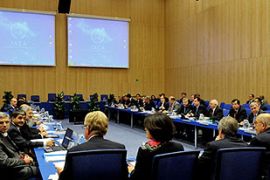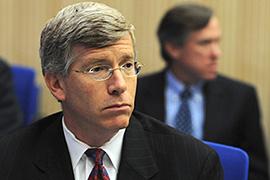‘Good start’ for Iran nuclear talks
UN atomic agency chief positive on meeting in Vienna despite earlier warnings from Tehran.

Although Tehran had also declared on Monday that it would refuse to meet French representatives at the talks, ElBaradei said: “We’re off to a good start. We have had a constructive meeting.
“Most technical issues have been discussed. We will continue the meeting at 10 am tomorrow.”
Ali Asghar Soltanieh, Iran’s envoy to the IAEA, endorsed ElBaradei’s remarks, saying he was speaking on Tehran’s behalf.
‘Dramatic news’
The meeting of Iranian, Russian, French and US officials started in the Austrian capital shortly after state-run Iranian television said Tehran would not deal directly with France since it had failed to deliver “nuclear materials” in the past.
Tim Friend, Al Jazeera’s correspondent in Vienna, described the announcement as “dramatic news”.
But a senior Western diplomat familiar with the talks said Iranian envoys engaged with all other delegations in the room and there were no grounds “to put out a gloom-and-doom message” about the gathering.
“Everyone at the table was making their points and listening to one another. It’s too early to tell the outcome,” the diplomat said.
“But there is nothing to prevent the talks ultimately moving forward.”
Junior delegation
Iran, which says it is enriching uranium only for electricity uses, had struck a defiant tone ahead of the meeting.
Ali Shirzadian, a spokesman for Iran’s atomic agency, said it was not “economically feasible” for Iran to further purify low-enriched uranium (LEU) itself to yield the 150-300 kg of material that it needs for its Tehran reactor, but that it would do so if the Vienna talks “do not bring about Iran’s desired result”.
| In video |
|
Tehran street reaction to Vienna talks |
Iran had sent only a junior-level technical delegation to the Vienna talks indicating it may not be ready for a final agreement this week.
“The talks this week are supposed to seal the deal,” said a senior Western diplomat, who requested anonymity.
“But, since we have had no negotiations thus far with the Iranians, the next couple of days could reopen a lot of what we hoped was already agreed in principle.”
Shirzadian told the official IRNA news agency that providing fuel for its Tehran reactor was “a good test to see whether the West is honest with Iran” and that Iran’s programme to produce five-per-cent LEU would continue, whatever the outcome.
“We will never abandon our right [to enrich],” he said.
Resistant material
LEU is used as fuel for nuclear reactors, while a nuclear bomb requires highly-enriched uranium.
Several world powers fear Iran’s nuclear programme is a front to obtain a bomb but Iran denies the charge and says it needs nuclear technology to generate power.
 |
| Daniel Poneman, deputy secretary of energy, represented the US at Monday’s talks [AFP] |
Western diplomats say Tehran must ultimately curb the programme to dispel fears of a growing LEU stockpile being highly enriched to produce nuclear weapons.
The Vienna talks are likely to run for two to three days and intended to finalise technical and legal aspects of the uranium proposal.
Western diplomats said Iran had signalled in Geneva that it was ready to ship about three-quarters of its declared stockpile of five-per-cent-enriched uranium to Russia for refinement to 19.7-per-cent purity, then to France for fabrication into fuel rods.
The material would replace the dwindling reactor fuel with material in a form that is resistant to higher enrichment.
For the powers, the deal’s payoff lies in greatly reducing Iran’s LEU reserve.
The stockpile has no apparent civilian use since Iran has no operating nuclear power plants, but is now enough to fuel one atomic bomb, if Tehran chose to enrich it to 90 per cent.
Western officials expect the deal to entail Iran sending out 1.2 tonnes of its LEU in one consignment before the end of 2009.